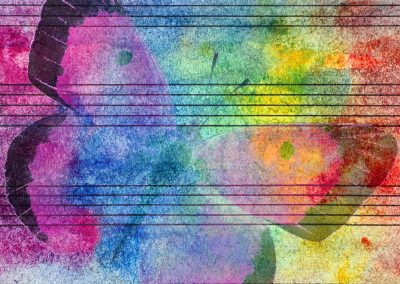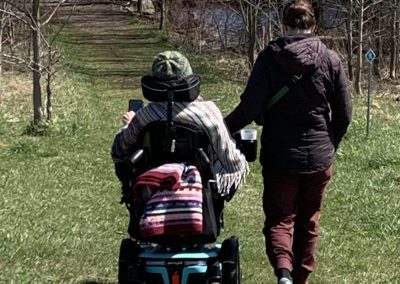While doing their doctorate at the University of Toronto, Kael was also an artist researcher on an interdisciplinary research team that investigated the public-school experiences of 2SLGBTQI+ families and youth across Ontario. The project was called, “LGBTQ Families Speak Out,” and as part of this project, the research team also developed “Out at School,” a 90-minute multi-media theatre production which was performed by the research team and professional actors at Toronto Pride and at LFest , a festival for queer and trans women and lesbians in Wales, UK. “Out at School” includes three original songs, Pushing the Envelope, Let Love be the Way, and Risk Hope, which Kael composed, recorded, and performed for the play. The songs are based on interview material collected for the “LGBTQ Families Speak Out” project.
Pushing the Envelope (2017)
Pushing the Envelope is the first song Kael composed for “Out at School.” The overarching theme in this song is the idea that 2SLGBTQI+ families and students often find themselves in the position of having to explain their families, identities, bodies, pronouns, and relationships to school personnel. This labour of explaining is kind of labour that is particular to 2SLGBTQI+ families and queer spawn, and a labour that cisheterosexual families and students generally do not have to do in schools. Kael also includes some lyrics written in the form of questions. Writing lyrics in the form of questions invites listeners to do some of their own intellectual and emotional labour around some of the themes in the song. The lyric “we shall overcome” is a nod to the well-known gospel-turned-activist song We Shall Overcome, which was a prominent anthem sung during the American Civil Rights movement. This reference to We Shall Overcome is also an acknowledgement of the long tradition of singing to overcome adversity, galvanize community, and inspire social and political change. Finally, incorporating several phrases borrowed verbatim from the monologues for “Out at School,” Pushing the Envelope projects a hope for the future: that one day, we won’t always have to be “pushing the envelope,” and that we won’t have to engage in this kind of queer and trans activist work because 2SLGBTQI+ families and people will be a part of “the fabric of this world.”
Written and performed by: Kael Reid, 2017
Sound engineer: Stew Crookes
Produced by: Stew Crookes and Kael Reid
Kael Reid: vocals, acoustic guitar
Stew Crookes: pedal steel
Doug Friesen: stand-up and electric bass
Roger Travassos: drums, percussion
Pushing the Envelope
Pushing the Envelope Lyrics
The same old question runs around in my mind
Should I speak or should I just keep quiet?
As though I owe them some kind of
Disclosure or explanation
Every single time and in every single situation
Some people don’t even have think about it
They don’t look beyond their own realities
How can we make sense of ourselves in this absence
That’s present everyday?
It’s like we’re fighting something bigger than we can name
Chorus
One day we won’t need to be
Pushing the envelope
We won’t be represented by
Permission slips home
It won’t be trendy
To advertise our families
And we won’t be legitimized
By posters on a wall
I don’t see myself amongst these pages
The people I love are nowhere to be found
Will someone please explain all this controversy around the word “family?”
Because I know that love and community create kinship, too
Anytime you bend the gender rules folks tend to notice
They always want to put you back in the box
What would it mean to live without the fear of being interrogated
To be free to articulate our bodies any way we want?
Chorus
One day we won’t need to be
Pushing the envelope
We won’t be represented by
Permission slips home
It won’t be trendy
To advertise our families
And we won’t be legitimized
By posters on a wall
Bridge
And I still feel this tension between
Wanting to be accepted
And wanting to let my freak flag fly
But I’m not a character in their narrative
And I won’t rehearse their lines for them
I’m writing a new script for you and me
About the beauty
Of non-conformity
We weave ourselves into the fabric of this world
Disrupting constructions of “boy” and “girl” and “boy-meets-girl”
Changing language and policy
Celebrating families, loves ones, and identities
If we raise our voices strong, we shall overcome
Chorus
One day we won’t need to be
Pushing the envelope
We won’t be represented by
Permission slips home
It won’t be trendy
To advertise our families
And we won’t be legitimized
By posters on a wall
Let Love Be the Way
Written and performed by: Kael Reid, 2018
Sound engineer: Stew Crookes
Assistant sound engineer: Andrew Scott
Produced by: Stew Crookes and Kael Reid
Kael Reid: vocals, acoustic guitar
Andrew Scott: drums, percussion
Kurt Nielsen: bass
Todd Lumley: piano, synth
Let Love Be the Way Lyrics
And I don’t know you
But I have a question or two
Thought I’d turn the tables
On you
What’s it like to walk down the street with your partner
And never wonder “what if?”
To know that wherever you go together
You’re safe because your love blends in?
Could you imagine being unexpected, unforeseen
In the grand scheme of things?
Then have to reveal yourself, describe and define your love
Your children, your family?
Chorus
What would it take to let love be the way
Could you listen to people and raise them up?
Could you up your own game and say, “No big deal”
Be inspired instead of afraid?
How would it feel to live two separate lives
To hide your true self away?
To have to conform to someone else’s arbitrary rules
And always be asked to explain?
Have you ever had to carve out a space for yourself
Because there was no room for you?
Imagine there were only five choices to line up at school
LGBT and Q
Chorus
What would it take to let love be the way
Could you listen to people and raise them up?
Could you up your own game and say “no big deal”
Be inspired instead of afraid?
Have you ever had to try and justify your body
To people you’ve never met
Or tried to translate yourself through someone else’s language
To make yourself legible?
Do you have to defend which public bathroom you use?
Have you ever thought about that?
And felt them attempt to decipher your intentions
While you’re standing there washing your hands?
Have you ever been told that you don’t know who you are
Your pronouns are wrong, they don’t match, they’re grammatically incorrect,
Your name is wrong, your clothes are wrong, your hair is wrong
Your feelings are wrong, your love is wrong
You are wrong?
Chorus
What would it take to let love be the way
Could you listen to people and raise them up?
Could you up your own game and say “no big deal”
Be inspired instead of afraid?
What would it take to let love be the way
Could you listen to people and raise them up?
Could you up your own game and say “no big deal”
Be inspired, could you be brave?
Has someone with good intentions worked to accommodate you
And tried to fit you in
Have you ever considered how accommodating someone
Doesn’t really change anything?
Let Love Be the Way (2018)
When composing the second song, Let Love be the Way, the predominant theme in the second set of monologues Kael worked with was the notion that 2SLGBTQI+ families and students often must (and thus, feel compelled to) explain themselves and their families to school personnel. From the monologues for “Out at School,” it was clear that 2SLGBTQI+ families and students do this either pre-emptively to avoid questions or problems that may arise in relation to their identities, relationships, and/or families; or in response to questions asked of them about these things. With this theme in mind, the song is composed of various questions directed at those who experience privilege in relation to their sexuality, gender identity/gender expression, and relationships. Let Love be the Way asks cisheterosexual folx to think about the privilege they have related to gender and sexuality. While composing this song, Kael also reflected on some of the experiences they have had, as well as the experiences that some of their 2SLGBTQI+ friends have had in relation to their identities and relationships. The song references trans scholar and visual artist, benjamin lee hicks’ (2017) notion that the presence of 2LGBTQI+ families and students is not always–but should be–expected in schools. This song also includes some short verbatim phrases from the monologues. The chorus references non-binary scholar, Lee Airton’s No Big Deal campaign, which they developed in response to a particular professor at the University of Toronto who publicly spoke out against using people’s chosen pronouns. The song ends with an important question about what systemic change might look like in schools, rather than simply accommodating 2SLGBTQI+ families and students. This question invites listeners to think more deeply about the politics of power implicit in the word, “accommodation,” and to consider what it means for 2SLGBTQI+ people to have to engage with a system that wasn’t created with them in mind.
hicks, b. l. (2017). Gracefully unexpected, deeply present and positively disruptive: Love and queerness in classroom community. Occasional Paper Series, (37). Retrieved from https://educate.bankstreet.edu/occasional-paper-series/vol2017/iss37
Risk Hope (2019)
Risk Hope is the final song composed for Out at School. It was composed to tie the major themes of the LGBTQ Families Speak Out project together and to bring the play to a close. It rests on the notion of “hope,” which is a prominent theme in the play, especially near the end. It’s meant to summarize a major theme of this research project, the idea that storytelling—in all its iterations—is vital to creating social change. The song also drives home the point that taking action—even in seemingly small ways—is a performance of activism and an expression of hope for a better world. The theme of “listening” is also prominent in this song, as many of the participants from the LGBTQ Families Speak Out project reported that teachers and school administrators need to listen to their students and take them and their identities seriously. The song begins with a reference to Bob Dylan’s 1964 song, “The Times They Are A-Changing,” and an acknowledgement that “the times” are constantly unfolding; that we, as a society, are in a constant state of becoming and moving forward—even if incrementally—towards equity and justice for all. In the bridge, the lyrics honour the work of cultural theorist and queer scholar of colour, the late José E. Muñoz, who understood hope as an anticipatory feeling of the “not-yet” and that queerness is “not simply a being but a doing for and toward the future” (Muñoz, 2009). Muñoz argues, “we need hope to counter a climate of hopelessness that immobilizes us both on the level of thought and transformative behaviors. None of this is to say that hope is easy to find or never misleading or potentially appropriated by reactionary agents and movements. Hope is a risk. But if the point is to change the world, we must risk hope” (Duggan and Muñoz, 2009, p. 279). Risk Hope is also a nod to the researchers of the LGBTQ Families Speak Out project, and the creative work and energy that infuses Out at School: “these words” that were carefully chosen from the interviews to craft the monologues; “these colours” that were meticulously selected to illustrate themes from the interviews; and “these songs” which were mindfully composed to narrate the interviews through music.
Risk Hope
Written and performed by: Kael Reid, 2017
Sound engineer: Stew Crookes
Produced by: Stew Crookes and Kael Reid
Kael Reid: vocals, acoustic guitar
Stew Crookes: pedal steel
Doug Friesen: stand-up and electric bass
Roger Travassos: drums, percussion
Risk Hope Lyrics
A poet in the 60’s used to sing,
“the times they are a-changing”
Well, that’s still true today
This old road is rapidly aging
Because we are advocating for ourselves
And for the ones that we love
Chorus
We believe taking action
Is an enactment of hope
Of the way things ought to be
Making art makes a new world
Possibilities unfurl
In the space of a story
Standing up can look a hundred different ways
Refusing to explain, changing our names
Finding labels to match how we feel
Resisting erasure is a statement
Insisting they listen to what we say about
Who we are and what we desire
Chorus
We believe taking action
Is an enactment of hope
Of the way things ought to be
Making art makes a new world
Possibilities unfurl
In the space of a story
Bridge
These words, these colours, these songs
Embody our critical collective longing
This is an archive our lives
A queer refusal to not be silenced
And José Muñoz reminds us
That we can go off script together
And, if we want to change the world
We must risk hope
We must risk hope
A poet in the 60’s used to sing,
“the times they are a-changing”
Well, that’s still true today
This old road is rapidly aging
Because we are advocating for ourselves
And for the ones that we love
Chorus
We believe taking action
Is an enactment of hope
Of the way things ought to be
Making art makes a new world
Possibilities unfurl
In the space of a story
Duggan, L. & Muñoz, J. E. (2009). Hope and hopelessness: A dialogue. Women & Performance: a Journal of Feminist Theory, 19(2), p. 275-283. DOI: 10.1080/07407700903064946
Muñoz, J. E. (2009). Cruising utopia: The then and there of queer futurity. New York, NY: New York University Press.



